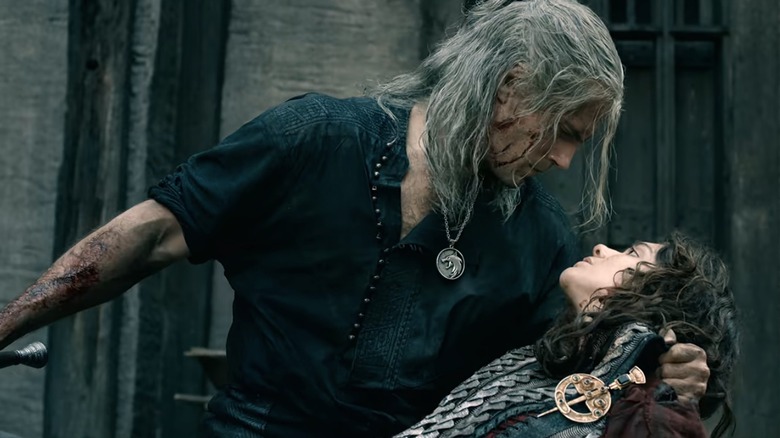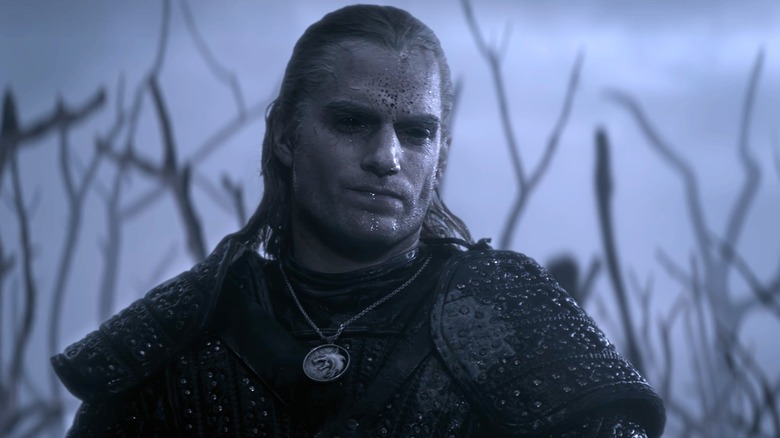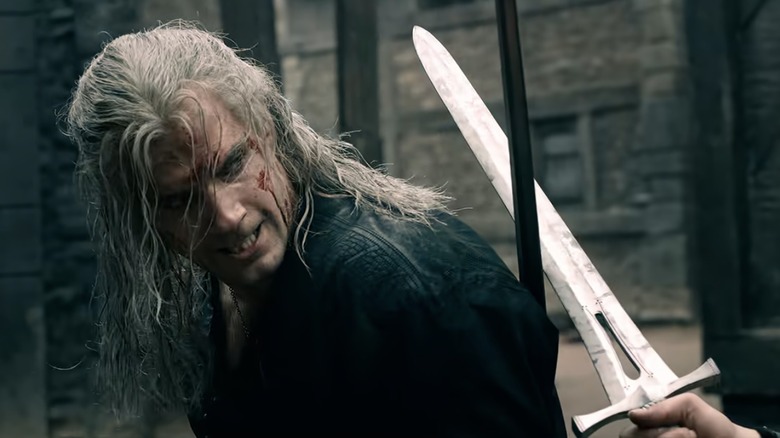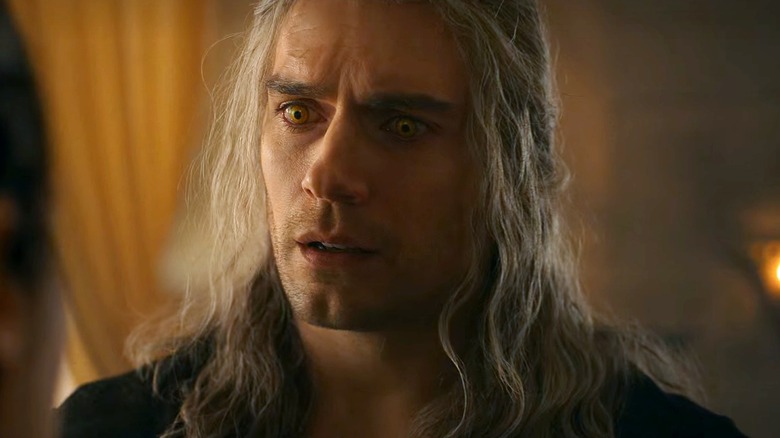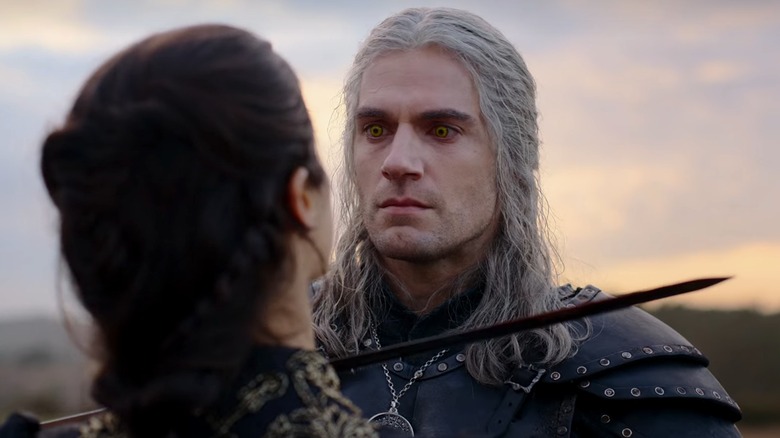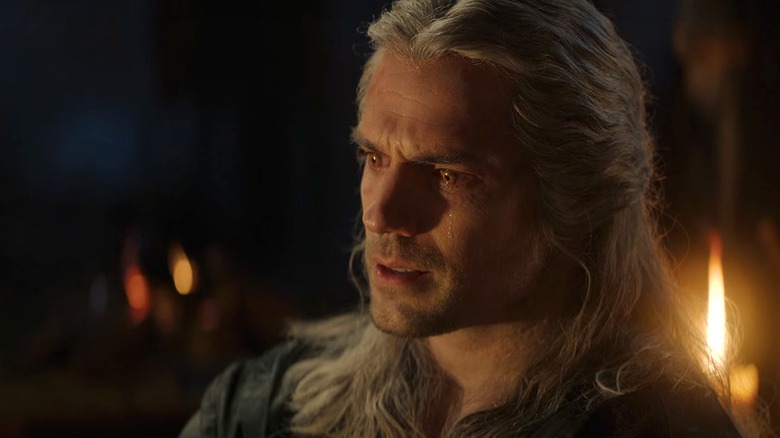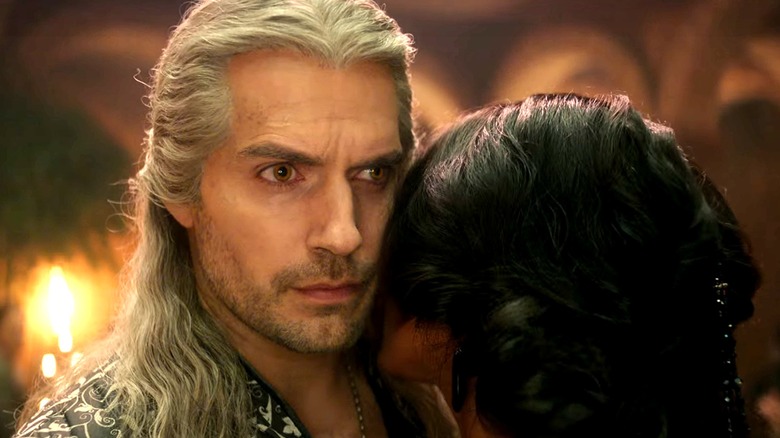The Witcher: Henry Cavill's 5 Best Scenes As Geralt Of Rivia
Dearly beloved, we're gathered here today not to mourn the loss of Henry Cavill's Geralt of Rivia, but to celebrate the three seasons, four years, and 24 episodes we were lucky enough to spend with him. Though we walk through the valley of the shadow of Season 4, we will fear no evil: for he art with us; his swords and his wig comfort us... forever.
Maybe it's a touch melodramatic to couch an actor's portrayal in such heavy terms, but the reality is that for many fans of "The Witcher," there really is, and will only ever be, one live-action Geralt. Hell, even for those who hated the series, Cavill's depiction of Andrzej Sapkowski's subversive spin on the knight in shining armor trope was a thing of beauty, and for good reason. Cavill didn't just play Geralt, he thoroughly understood and appreciated him. As a result, he fully embodied him, incarnating a character whose innate complexity, depth, and subtle humor had previously struggled to make the leap from page to screen.
In honor of that embodiment, we've chosen the following scenes using some very specific criteria: first, the scene had to give us new and necessary insight into who Geralt really is; second, Cavill's knowledge of and passion for the character had to play an integral role in the success, memorability, and meaningfulness of the scene itself. Because of this, they're not all fight scenes. In fact, most of them aren't. So much of what made Cavill's Geralt compelling and tangible happened in those quiet moments that occasionally poked through the chaos — a sidelong glance, a perfectly timed pause, or a subtle shift in the character's awareness of himself, his situation, and his relationship to others.
That said, we will be kicking things off with some fight scenes. Because let's not kid ourselves — they're cool AF.
Cavill has been The People's Geralt since day one, scene one
In Henry Cavill's first appearance as Geralt, the stakes were high, the burden heavy, and the task itself close to impossible. In-world, he did battle with a fierce and fearsome Kikimora. In our world, he took on and conquered a monster of an entirely different nature — one with many, many more legs, and a much broader reach. Taking on a character with not one, but two long-established fandoms means taking on the expectations of a fiercely passionate, opinionated, and, all too often, unappeasable cacophony of critics. And you only get one chance, as they say, to make a first impression. That's all Cavill needed.
But while his spectacular stunt and sword work during his tête-à-tête with the giant swamp spider from hell — much of which he spends submerged in said swamp — is a breathtaking thing to behold and an exciting way to set the stage and standard for fights to come, these are not actually the most notable elements of the scene. As is so often the case with Cavill's performance in Season 1, it's his ability to get a full chapter's worth of characterization across using nothing but body language and a handful of words that most thoroughly belies the difficulty of the task at hand.
From the moment that Cavill, still dripping with swamp water and Kikimora guts, first looked down at a doomed, freshly injured fawn and said — with equal parts pragmatism, pity, and weariness — "Today's not your day, is it?", he simply was Geralt. He didn't just fight like Geralt, look like Geralt, and sound like Geralt. In that moment, he showed fans that he knew how to see the world through Geralt's eyes. More importantly, he introduced that character, in all his dimensions, to a whole new set of fans. That knowledge, and the actor's consistent use of it, served him well throughout the series, and more than once in the pilot.
The Butcher of Blaviken earns his epithet
There's something about the dance that is a good old-fashioned, human-on-human sword fight that trumps even the most spectacular of CGI-laden monster skirmishes every time. Maybe it's the mesmerizing choreography, the swish, clank, and clatter that punctuates each perforating meeting of steel on steel, or the high-pitched ringing that resonates throughout. More likely, however, it's the fact that although we're acutely aware of the skill, strength, and stamina required to make such a struggle feel real they don't, when executed properly, appear to require much more than a sword and some rhythm. Such is the case when Geralt unwillingly battles Renfri (Emma Appleton) in the village of Blaviken. Not since Cary Elwes and Mandy Patinkin pulled off their lengthy feat of dazzling ambidexterity and affair of honor acumen in "The Princess Bride" has a sword fight been so simultaneously fluid, impressive, emotive, and impossible to look away from. And although the duel clearly owes an enormous debt to Appleton, Henry Cavill's off-screen skills and knowledge of his character played as large a part in the scene's success as his prowess with a sword (or two).
It was Cavill who brought "Mission Impossible" go-to Wolfgang Stegemann in for the re-shoots, and worked with Stegemann and his team to design the fight. As he explained in an interview with IGN, "The important thing [in the scene] was to show the storytelling aspect... to show different sides of Geralt." The viewer feels and sees Geralt's inner conflict when he realizes he has no choice but to make a choice and submit to the notion of "greater" and "lesser" evils. His fight style remains, but there's a distinct reluctance in his approach to Renfri — one that only comes through because Cavill has an astute understanding of his character's position and motivation. Without that understanding, it would just be two hot people clanging swords. Would it be entertaining? Sure. But memorable and meaningful? Not so much.
Cavill and Chalotra gave a complex reunion the depth it deserved
There's a lot of ways Henry Cavill and Anya Chalotra could have played Geralt and Yennefer's much-anticipated reunion in Season 2's "Dear Friend." Lucky for us, the actors had a say in the matter. In 2021, Cavill spoke with SYFY about the actors' approach to the moment, and how it differed from the much more sexually-charged reconciliation the writers had in mind.
"We just wanted to be very careful that it was true and real," he said, adding, "We wanted it to be emotional rather than sexual." Bear in mind that when the pair first meet, Geralt believes Yennefer is dead, and Yennefer has no knowledge of Geralt or his decision to foster his child (Freya Allan's Ciri). What's more, the last time they spoke, the revelation that Geralt bound their fates together via the djinn led Yennefer to abandon him, presumably for good.
"These are people who believe one thing about the fate of another, and then find out something else is true," he noted. Both actors wanted to illustrate what processing that information — as well as their pain, relief, regret, and joy — would actually look and feel like. "They just want to be with the person and emotionally recognize their existence again in that shared space," Cavill said, adding, "So, Anya and I worked to make sure that that was an emotional beat rather than anything else."
The effort paid off. Fantasy is, by definition, an over-the-top, unrealistic genre. But if the characters themselves are behaving fantastically, you lose the humanity that allows such an overtly make-believe world to speak, with any real relevance or meaning, to our own. All that's left, at that point, is bad musical theater with more jewel tones, fewer songs, and even less relatability. Season 2's reunion was an exquisitely performed team effort — one that gave audiences another side of Geralt and a greater awareness of what Cavill's motivation did for both his character and the series.
A betrayal, a beheading, and a heartbreaking beat
Sometimes, it's all about the pregnant pause — the tension-filled beat between the reiteration of words that reveals something's just occurred inside the character, and that makes that revelation feel like it's happening in real-time. It only ever happens in film and television, since in real life, moments of such high emotion inhibit, rather than enhance, our ability to articulate. Because of this, it takes a convincing actor to gracefully navigate such a moment and deliver it in a way that raises the hair on our arms rather than our skepticism. And no one has ever depicted such a moment with the degree of sincerity and believability that Henry Cavill does when he — whilst holding a sword to Yennefer's throat — responds to his friend's question about whether or not Ciri is his.
So much has to happen in that moment, and it does. If Geralt was ever unsure about his ability to protect Ciri, and to hold that duty up as his sole purpose in life, any lingering fear or doubt is effectively obliterated in the moment he realizes not just that he sees her as his daughter, but that he's willing to kill anyone, including the woman he loves, to save her. Yennefer feels it. Zigrin (Jeremy Crawford) feels it. Most importantly, the viewer feels it. In the time it takes Geralt to look away from Yennefer and toward Zigrin, something in his world — and thus the very destiny of the Continent — forever shifts.
Of course, if the details of a nuanced delivery aren't really your thing, there's always the fact that he's just charged in on a horse, medieval cowboy style, and to his own theme song, effortlessly lopping off the head of a bad guy. And if that entrance didn't make you want to get up off your couch and cheer, you might want to see a doctor about your complete and utter lack of pulse.
Big witchers DO cry
While Andrzej Sapkowski's readers know all about Geralt's turmoil regarding his mother's decision to turn him over to become a witcher, by Season 3, Episode 3, viewers of the series still know little about Geralt's origin.
Thus, in a single conversation with his mother's friend, Anika (Catherine McCormack), Henry Cavill must relay a lifetime's worth of Geralt's pain, self-doubt, and long-stifled feelings of loss, longing, anger, and love, while processing the revelation of his mother's brutal death. A lesser actor might easily have leaned too heavily into Geralt's anger, failing to recognize that anger as a mere by-product of a child's confusion — not just over what his mother did, and why, but over how he feels about it, and her. The most heartbreaking lines in the scene aren't those wherein he questions her decision, but those that reveal the innocence — and ignorance — of the child himself.
The unexplained disappearance of his whole world turned the child that would be Geralt into a walking open wound, and in just a few lines of dialogue, Cavill manages to connect that wound, for viewers and readers alike, with all that came after. Everything from his emotional unavailability, to his wish to bind Yennefer's fate to his, to his determination not to abandon Ciri, is the result of that fateful, painful day. And, given how integral destiny and fate are to the story, Cavill's ability to make those connections for us — without making it seem as though Geralt himself fully understands them — is paramount to honoring the greater themes of the story and the all-too-human witcher at its center.
The art of Geralt
As a very wise mage once said, "Nobody smart ever plays fair." In that spirit, we're not only cheating by sneaking in a runner-up, but by making that runner-up an entire episode. How could we not? While Season 5's "The Art of Illusion" contains little in the way of swashbuckling feats of heroism or thrilling monster kills, the fish-out-of-water set-up allows Henry Cavill to flex muscles not even the infamous bathtub scene was able to expose: his comedic chops. Whether avoiding come-ons from the surrounding "den of nymphomaniacs," pantomiming a melodramatic duel, twirling Yen across the dance floor with equal parts plotting and panache, or throwing levels of shade at Vilgefortz (Mahesh Jadu) that would make Leighton Meester's Blair Waldorf blush, Cavill handles comedy and contempt with an ease that gives the episode's title added meaning. Moreover, he does it all without dropping an ounce of the grit, gravel, and mystery that make his Geralt, the Geralt. That's a lot for one actor to juggle with just two hands, and in the end, it's also what endeared audiences to his performance.
On the one hand, his enthusiasm for and intimate knowledge of the source material allowed him to give readers the hero they'd for so long imagined. On the other, his ability to understand, analyze, and portray the complexity with which human beings actually operate kept that hero from being too archetypal and fantastic to feel for, relate to, and find meaning in. Like all the best song covers, Cavill maintained the original's essence without simply playing the notes, and going through the motions beat for beat. In doing so, he didn't simply portray a character — he brought that character to life.
